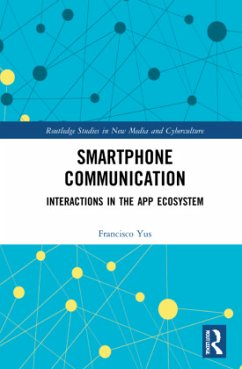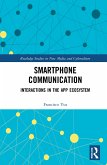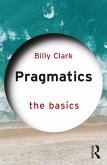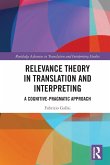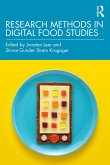This book offers a unique model for understanding the cognitive underpinnings, interactions and discursive effects of our evolving use of smartphones in everyday app-mediated communication, from text messages and GIFs to images, video and social media apps.
Adopting a cyberpragmatics framework, grounded in cognitive pragmatics and relevance theory, it gives attention to how both the particular interfaces of different apps and users' personal attributes influence the contexts and uses of smartphone communication. The communication of emotions - in addition to primarily linguistic content - is foregrounded as an essential element of the kinds of ever-present paralinguistic and phatic communication that characterises our exchange of memes, GIFs, "likes," and image- and video-based content. Insights from related disciplines such as media studies and sociology are incorporated as the author unpacks the timeliest questions of our digitally mediated age.
Aimed primarily at scholars and graduate students of communication, linguistics, pragmatics, media studies, and sociology of mass media, Smartphone Communication traffics in topics that will likewise engage upper-level undergraduate students.
Adopting a cyberpragmatics framework, grounded in cognitive pragmatics and relevance theory, it gives attention to how both the particular interfaces of different apps and users' personal attributes influence the contexts and uses of smartphone communication. The communication of emotions - in addition to primarily linguistic content - is foregrounded as an essential element of the kinds of ever-present paralinguistic and phatic communication that characterises our exchange of memes, GIFs, "likes," and image- and video-based content. Insights from related disciplines such as media studies and sociology are incorporated as the author unpacks the timeliest questions of our digitally mediated age.
Aimed primarily at scholars and graduate students of communication, linguistics, pragmatics, media studies, and sociology of mass media, Smartphone Communication traffics in topics that will likewise engage upper-level undergraduate students.
"This work will be of interest to a manifold and extensive audience... it will decisively help to comprehend a communicative phenomenon that has become pervasive in our daily lives, and a tool which everyone uses for any purpose we commonly need or can think about. [...] All in all, the work becomes an indispensable tool and a starting point for anyone intending to undertake any further research related to the possibilities and opportunities opened up by smartphones."
-- Maria Angeles Ruiz-Moneva, University of Zaragoza, Spain
"The book offers a valuable view by proposing an "ecosystem" in which smartphone apps, like a biological ecosystem, connect users to each other tightly, reflecting the spontaneity and indispensability of SMC. As such, the most valuable contribution of the book lies in its in-depth cognitive investigation, especially of motivation, emotion, and feeling in relation to SMC. SMC is clearly not just a social phenomenon, but also a psychological human need to survive in the app ecosystem. In this sense, the old definition of communication needs to be rewritten as a cognitive activity triggered by psychological needs of connection and bonding."
-- Jinmei Lyu, Anhui University, Hefei, PRC
"Yus' monograph shows he knows his classic [Relevance Theory], and is heavily indebted to it. But classic RT scholars simply cannot afford to ignore his book. The medium is the message, as McLuhan taught us decades ago, and smartphones have affordances and constraints that are quite different from the paradigmatic spoken exchanges between Mary and Peter. Hopefully the awareness that even purely verbal information goes far beyond conveying 'propositions' - as transpiring in text-altering strategies such as capitalization, lengthened words, repetition, onomatopoeia and oralization (p. 239) - can help build bridges with language-oriented RT, and help RT mature into the communication theory to beat all other communication theories."
-- Charles Forceville, University of Amsterdam, Netherlands
"Despite its ubiquity today, smartphone communication has received much less scholarly attention than has computer-mediated communication; for this reason, the book under review is a timely and welcome response to this scholarly inadequacy in the smartphone era"
--Tiancheng Chen & Xinren Chen, University College London and Nanjing University
"The book offers thought-provoking findings on how to interpret smartphone communication from both the linguistics dimensions and the user-related dimensions. It will serve as an important reference for readers interested in pragmatics, discourse analysis and digital communication studies"
--Jinlong Yang and Xinren Chen, School of Foreign Studies, Nanjing University
"The present volume is not only original and interesting, but also provides a cutting-edge approach to smartphone communication, relevant not only to researchers in cyberpragmatics or digital communication but also to anybody interested in smartphone communication. Indeed, and despite adopting a cyberpragmatic approach, the author also includes references and results from other disciplines such as psychology, among others. Furthermore, the author demonstrates he is an expert in the field of smartphone communication (and digital communication for that matter), providing readers with clear definitions of key concepts, updated references at an international level, useful figures and plenty of examples from different platforms and apps, all written in impeccable academic (albeit accessible and reader-friendly) language."
--Carmen Maíz-Arévalo, Universidad Complutense de Madrid
"Yus' book is obviously mandatory reading for smartphone scholars and pertinent to new media researchers in general (the impressive bibliography contains many up-to-date references to new media sources), also because of the ethical issues Yus raises. For example, the hybrid space created by using smartphone apps is heavily and disturbingly affected by algorithms that escape our awareness, and thus inevitably influence our understanding of the world. An aspect of this is that we may be tempted to attribute human-like status to automatically generated app messages. Furthermore, multimodality scholars will benefit from this book."
-- Charles Foceville, Visual Communication 24(1), 2025, 253-256
-- Maria Angeles Ruiz-Moneva, University of Zaragoza, Spain
"The book offers a valuable view by proposing an "ecosystem" in which smartphone apps, like a biological ecosystem, connect users to each other tightly, reflecting the spontaneity and indispensability of SMC. As such, the most valuable contribution of the book lies in its in-depth cognitive investigation, especially of motivation, emotion, and feeling in relation to SMC. SMC is clearly not just a social phenomenon, but also a psychological human need to survive in the app ecosystem. In this sense, the old definition of communication needs to be rewritten as a cognitive activity triggered by psychological needs of connection and bonding."
-- Jinmei Lyu, Anhui University, Hefei, PRC
"Yus' monograph shows he knows his classic [Relevance Theory], and is heavily indebted to it. But classic RT scholars simply cannot afford to ignore his book. The medium is the message, as McLuhan taught us decades ago, and smartphones have affordances and constraints that are quite different from the paradigmatic spoken exchanges between Mary and Peter. Hopefully the awareness that even purely verbal information goes far beyond conveying 'propositions' - as transpiring in text-altering strategies such as capitalization, lengthened words, repetition, onomatopoeia and oralization (p. 239) - can help build bridges with language-oriented RT, and help RT mature into the communication theory to beat all other communication theories."
-- Charles Forceville, University of Amsterdam, Netherlands
"Despite its ubiquity today, smartphone communication has received much less scholarly attention than has computer-mediated communication; for this reason, the book under review is a timely and welcome response to this scholarly inadequacy in the smartphone era"
--Tiancheng Chen & Xinren Chen, University College London and Nanjing University
"The book offers thought-provoking findings on how to interpret smartphone communication from both the linguistics dimensions and the user-related dimensions. It will serve as an important reference for readers interested in pragmatics, discourse analysis and digital communication studies"
--Jinlong Yang and Xinren Chen, School of Foreign Studies, Nanjing University
"The present volume is not only original and interesting, but also provides a cutting-edge approach to smartphone communication, relevant not only to researchers in cyberpragmatics or digital communication but also to anybody interested in smartphone communication. Indeed, and despite adopting a cyberpragmatic approach, the author also includes references and results from other disciplines such as psychology, among others. Furthermore, the author demonstrates he is an expert in the field of smartphone communication (and digital communication for that matter), providing readers with clear definitions of key concepts, updated references at an international level, useful figures and plenty of examples from different platforms and apps, all written in impeccable academic (albeit accessible and reader-friendly) language."
--Carmen Maíz-Arévalo, Universidad Complutense de Madrid
"Yus' book is obviously mandatory reading for smartphone scholars and pertinent to new media researchers in general (the impressive bibliography contains many up-to-date references to new media sources), also because of the ethical issues Yus raises. For example, the hybrid space created by using smartphone apps is heavily and disturbingly affected by algorithms that escape our awareness, and thus inevitably influence our understanding of the world. An aspect of this is that we may be tempted to attribute human-like status to automatically generated app messages. Furthermore, multimodality scholars will benefit from this book."
-- Charles Foceville, Visual Communication 24(1), 2025, 253-256

